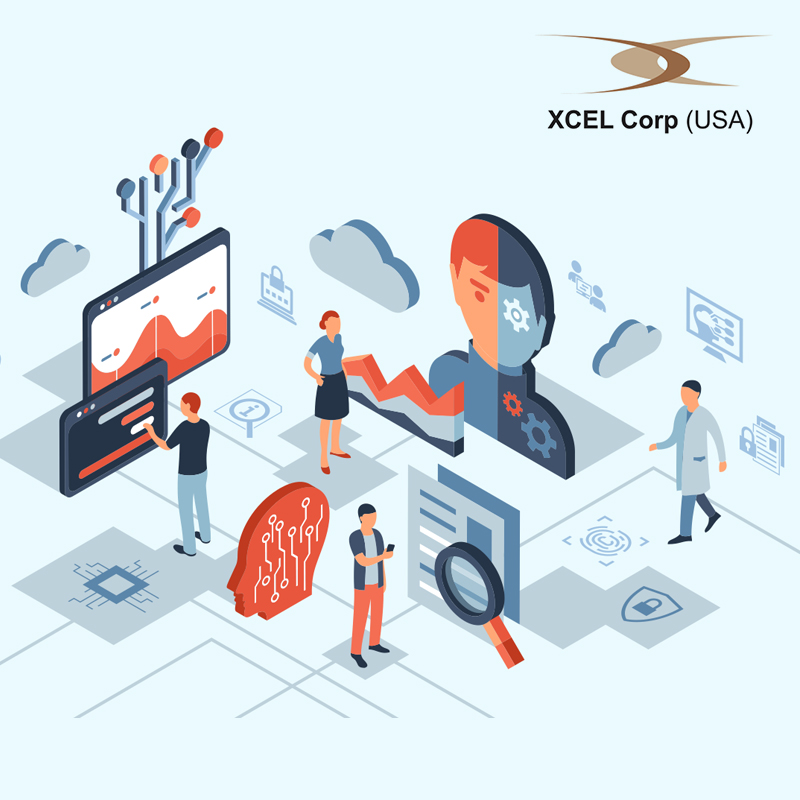AI or Artificial Intelligence is fast emerging in the technology industry and is even seen taking center stage at several conferences. Its potential is showcased across industries with retail and manufacturing leading the way. Virtual assistants and chatbots are in-built into newer applications thus enabling easy customer interaction and product knowledge. The consumers can derive all that they require by simply logging into the suppliers’ product page. Artificial Intelligence is also being integrated as an intelligence layer across the tech stacks by industry giants such as Microsoft, Google, and Salesforce. Artificial Intelligence seems more like a movement than a Utility and yet we are not expecting Jarvis or Tony Stark’s assistant.
Existing tech is rendered smarter and the power of data collected by enterprises is unlocked with the help of AI. Machine Learning or ML, Deep Learning and NLP or Natural Language Processing are advancing, making it easier than ever to create an AI algorithm or layer that is conditioned into cloud computing or the software.
Depending upon organizational and business intelligence or BI needs, businesses can apply Artificial Intelligence practically to enable manifestations and data insights thus driving engagement and CRM or customer relationship management. Logistics and efficiency are markedly optimized when assets are tracked and managed through AI. For example, the General Manager of the Global AI+ Accelerator program from TechCode, Luke Tang, states that ML is playing a crucial role in the emergence of AI where companies are now trying to infuse the technology into their existing products and services. Thus, the recent progress of ML is driving AI to newer levels and as far as enterprises are concerned some of the core business processes revolving around control, coordination, allocation, and reporting will be disrupted by Artificial Intelligence.
XCEL Corp helps you successfully integrate AI into your business and ensures successful implementation. Here are some pre-implementation pointers:
Getting acquainted with AI
Modern AI can do a lot of things, and organizations should make an effort to familiarize themselves with their attributes. A wide variety of resources and a wealth of information is available online for industries to acquaint themselves with the basic concepts of Artificial Intelligence. Attend remote workshops or take online courses offered to increase your Knowledge of predictive analytics and ML to get closer to Artificial Intelligence.
Some resources you can look into are:
• Microsoft – Open Source Cognitive Toolkit or CNTK – developers can master their deep learning algorithms here
• Online lectures provided by Stanford University on Artificial Intelligence: Principles and Techniques
• The open-source code directory from the AI Access Foundation called AI Resources
Problem Resolutions
AI is meant to resolve your business problems. Identify the issues and explore different ideas to add Artificial Intelligence abilities to existing products and services. Specific use cases should be developed in which AI could play a role in resolving your business issue and add demonstrable value to your company. Draw up an overview of existing programs and issues associated with it. Track the possibility of using image reception, ML and other AI-associated ideas, into your products. Then gather a workshop for the company’s management and introduce the idea to them.
Value prioritization
Assess and evaluate the business or financial value of AI implementations. Map the initiative directly to the business value to ascertain dimensions of feasibility and prioritize them based on near-term visibilities. Recognition and ownership must both come from top-level executives and managers.
Capability Gaps
A business should be aware of its competences. There may be a lot an organization wants to achieve but there is only that much it is capable of achieving. While launching a full-blown AI implementation, it is extremely important to address if the process and tech perspectives are well-aligned with the idea.
Data integration
Ideally, when you implement ML into the business, you have to remove any existing data, which is spread across multiple data silos. It is highly imperative to form a task force that will obtain high-quality data and integrate all the different data sets. All inconsistencies have to be sorted out so that data is rich and accurate and contains all the dimensions as expected by ML.
Storage plans
There are several requirements for implementing an AI solution. This means algorithms have to be improved and huge volumes of data have to amass to build precise business models so that augmented AI solutions are implemented to achieve all your computing objectives. A fast and optimized storage has to be considered at the beginning of the AI system design.
Expert project managers at XCEL Corp
To begin AI building and integration, one of the most important factors to be considered is the project goal and your expertise in the area. While, as a business, you are still a learner, it is best to outsource AI integration and implementation activities to experts at XCEL Corp for this pilot project. As external consultants, we will interact with your internal resources to keep you focused on your AI goals and draft realistic project timelines to complete your AI implementation successfully.
If you need any help, email us at contact@xcelcorp.com or use the contact form to submit a request.


 It is expected that 50 billion smart devices will be in use globally by 2020. 5G is a network defined which will replace…
It is expected that 50 billion smart devices will be in use globally by 2020. 5G is a network defined which will replace…
